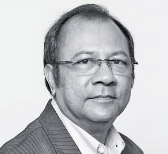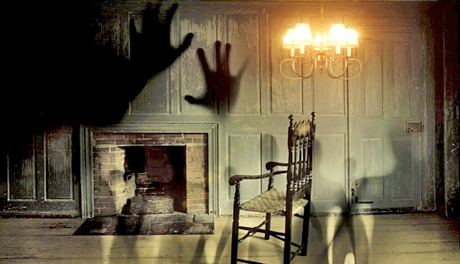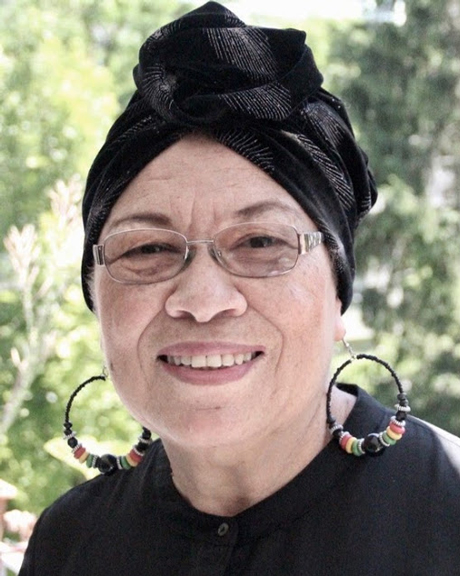October 3, 2018 issue
Authors' & Writers' Corner

Kamil Ali
Her six-month-old baby’s laughter in the middle of the night pulled Mary out of sleep. The alarm clock on the night table showed three o’clock.
Not sure if she had dreamt of the baby’s giggles, she strained her ear for sounds in the baby’s room next door. After a few minutes of silence, Mary turned away from her husband and settled into a comfortable position to catch up on her sleep.
Baby Jane’s fussing for her morning feed at five o’clock sent Mary scurrying to the kitchen for a bottle of milk. While the milk warmed in the microwave, she hurried to the nursery to lift her baby out of the crib for a cuddle and a change of diaper before the baby started crying for lack of attention.

Mary’s preoccupation with Jane’s needs pushed the incident two hours earlier out of her memory until she opened Jane’s bedroom door. She gasped when a shadow leaning over the crib vanished a split second before her eyes focused on it.
Mary took tentative steps toward the crib. The feeling of an invisible presence in the room gave her goosebumps. She snatched Jane from the cradle and scampered out of the room, too scared to do a diaper change.
Mary carried Jane in her arms to get her milk and sit on the high backed wooden chair in the family room to feed her. The chair had left its place against the wall and stood in front of the fireplace!
Spooked by the occurrences, Mary turned her eyes away from the family room and dashed into her bedroom. She closed the door with a soft thud and hopped onto the bed to feed Jane in the security of James’ company. Jane fell asleep after she drank the bottle of milk. Mary lay awake and alert. Each sound pushed her closer to James.
James opened his eyes at seven with Mary’s back jammed against his. Curiosity crossed his face when he turned to face her and spotted Jane on the bed.
“James, did you move the chair in the family room?” Mary had to ask the provocative question that troubled her.
“What chair?” He blinked a few times to wipe sleep away.
“The chair I use to feed Jane,” Mary whispered.
“No,” James whispered back. “Why?”
“Something strange happened last night.” Mary cleared her throat.
“What happened?” James sounded impatient.
Mary related the odd occurrences. James shrugged the incidents off and got up to get ready for work. Mary put two pillows beside Jane to keep her from rolling off the bed and went to the kitchen to prepare breakfast.
Before James left the house, Mary ducked into Jane’s room to get the diaper bag, which she dropped off in her room, where Jane slept like an angel. James moved the chair back to its usual place in the family room.
Mary and James chatted about current events during breakfast. After breakfast, they kissed goodbye, and James left for work.
Jane awoke for her scheduled mid-morning bath and feed. Mary bathed Jane in her baby tub at the kitchen sink and fed her a bottle of milk at the kitchen table to avoid the family room and nursery.
After an hour of playing, Jane yawned and fretted. Mary took her to the master bedroom and gave her milk until she nodded off. Mary laid her between the two pillows and tiptoed out the room. She left the door ajar to listen in on Jane.
While doing the dishes, terror paralyzed Mary for a moment when the chair scraped the wooden floor in the living room. Holding her breath to steel her nerves, she advanced toward the kitchen entrance to peer into the family room. Her stomach churned! The chair had moved to its previous location in front of the fireplace.
She darted to the master bedroom when Jane giggled with delight and cooed. On her approach to the master bedroom’s door, she caught a glimpse of a shadowy figure bending over Jane.
The house shook when the door slammed shut in Mary’s face. Startled by the bang of the slammed door, Jane screamed at the top of her voice.
“Leave my baby alone!” Mary yelled at the mysterious dark entity while she fought with the doorknob and rammed her shoulder against the door.
Adrenaline numbed Mary’s pain of flying leaps that crushed her shoulders against the door until it splintered and flew open.
She snatched Jane and ran to the door in the family room to exit the house. Shadows blocked the door to bar her exit, but she had reached the fearless and unstoppable ferocity of a wounded mother fighting for the life of her child. The shadows’ intimidation by fear no longer worked on Mary.
She ran right through the ice cold shadows and spun around as she leaped to slam her back against the door with the screaming Jane tucked against her tummy.
After a dozen battering rams at the door, she passed through and somersaulted, rolling herself into a ball to protect Jane.
The neighbor across the street gave them shelter and told them the history of the house that sat on the gateway to the dark side.
The woman told Mary that the shadows possessed the bodies of the most vulnerable members of families who moved in and turned them into evil beings. The possessed persons attacked the other members of the household until self-defense resulted in murder, which provided the human sacrifice needed to feed the shadow’s blood-lust.
“We tried to warn you.” The neighbor admonished. “You’re one of a few who have managed to escape through strong-willed defiance.”
“We thought you had a prejudice against us city folks.” Mary apologized. “James had a transfer with his job, and this house seemed just perfect for our family.”
James had the house demolished to stop another innocent family from suffering the unfortunate fate of the owners who had lived and died in the house before.

By Romeo Kaseram
Althea Romeo-Mark was born in 1948 in English Harbor, Antigua, to Gilbert Romeo and his wife. Her father was born in the Dominican Republic, with her mother coming from Saint Croix, US Virgin Islands. When she was eight years old, Romeo-Mark’s family moved to St Thomas in the US Virgin Islands. As a young girl she attended the St Peter and Paul Catholic School, graduating in 1967. In 1971 Romeo-Mark graduated with a Bachelor of Arts degree from the University of the Virgin Islands in Education and English. After a brief teaching tenure at Addelita Cancryn Junior High School in St Thomas, she left for Kent State University in Ohio, where she studied for a Master of Arts degree in Literature in 1974.
Speaking with Kris Rampersad in her blog, Caribbean Literary Salon, in 2010, Romeo-Mark ascribes her urge to travel filtering down from the genealogical lineage of both parents and grandparents. Wikipedia notes these scattered geographical origins starting with her father, who was from the Dominican Republic; however, the heritage extends outwards, with the Romeo-Mark’s paternal grandmother being Antiguan, but of British heritage, with her paternal grandfather coming from Saint Martin. Also, while Romeo-Mark’s mother was from Saint Croix, her maternal grandfather was Antiguan, but of black South African heritage, while the maternal grandmother was from Nevis.
Speaking with Rampersad, Romeo-Mark notes: “The travel bug was instilled in me at a young age as we often visited relatives in Antigua, Nevis, St Kitts, and visited nearby islands like St Croix, the British Virgin Islands, and Puerto Rico. I also visited the Dominican Republic and Haiti, first as a teenager and later in my early twenties. I fell in love with the African culture and features of Haiti then. I felt that if one hadn’t been to Africa, a trip to Haiti would suffice.”
Romeo-Mark adds: “In graduate school at Kent State University I was introduced to West African students, particularly Liberians, by fellow West Indians. We shared a common spirit and culture, lived in similar climates and ate the same food (cassava, yam, plantain, breadfruit, soursop, sugar apples, mangoes, etc). I was encouraged to travel to Liberia because of this close friendship and feeling of kinship.”
Following her MA degree, Romeo-Mark taught in the Department of Pan-African Studies at Kent State University for a year, and decided she wanted to continue teaching adults. She taught middle school briefly in St Thomas before leaving for Liberia in 1975, after an earlier but brief summer visit. It was while teaching at the University of Liberia in 1976 where she met her future husband, Emmanuel, a Grenadian national who had returned to Liberia from Switzerland. Married in 1977 and living in Liberia, Romeo-Mark says she and her husband survived the military take-over in 1980, and several coup d’etat attempts during that decade.
Writing in Routledge Encyclopedia of Post-Colonial Literatures in English, Second Edition, Vincent O. Cooper notes Romeo-Mark's poetry was first published in 1971 in VIP (1970-1972), a University of the Virgin Islands publication of creative writing edited by David Gershator. Following these poems, Romeo-Mark went on to publish more poetry collections, including a few short stories. Among these publications are Shu Shu Moko, Jumbi – The Silent Dancing Spirit (1974), Palaver: West Indian Poems (1978), Two Faces, Two Phases: Poems – Short Stories (1984), and Beyond Dreams: The Ritual Dancer (1989). According to Cooper, “Romeo-Mark code switches between Virgin Islands/West Indian vernacular and Standard English in subtle, unobtrusive ways to explore her ancestral and psychic cultural roots. She often approaches such subjects as Afro-Caribbean traditions, culture conflict, social consciousness, Caribbean nationalism, ancestral roots and male-female relationships with a deceptively quiet sense of irony, sensitivity and empathy. Even in her protest poems, Romeo-Mark never gets as explosive as Esther Phillips or Pamela Mordecai. Her attitude to the notion of African roots is reminiscent of the balanced perspective of Velma Pollard’s work, and her evolving attitudes to male-female relationships approach the understated ambivalence of Lorna Goodison.”
Wikipedia notes starting in the 1990s, Romeo-Mark’s poetry and short stories also began appearing in two regional journals in the Caribbean, The Caribbean Writer and POUi, the literary journal of the University of the West Indies, with several writings published in international anthologies as Sisters of Caliban: Contemporary Women Poets of the Caribbean in 1996; there was also the short story ‘Easter Sunday’, which was published in the Norwegian anthology Karibia Forteller in 2001. In 2009 she published a fifth volume of poetry, If Only the Dust Would Settle.
Responding to Rampersad on the wielding of two idioms in writing – Standard English and West Indian dialect, and the decision on which to chose during composition, Romeo-Marks says it is based on the subject: “the mood in which it comes to life, and the rhythm in my head”. Romeo-Mark adds: “Sometimes the subject naturally dictates that the poem should be in English Creole. I use a lot of dialogue in my short stories and I try to have the characters speak naturally if the story is set in the Caribbean or Liberia. I am a better poet than short story writer. It takes me a long time to write a short story that I feel is publishable.”
Romeo-Mark is a founding member, along with C. William Allen, Keith Neville Asumuyaya Best, Henry Gensang, Thomas Johnson, and Ruth Wuor, of the Liberian Association of Writers in 1984. She has been honoured by the Virgin Islands Council on the Arts, the Breadloaf Writers Conference, and the Cuyahoga Writers Workshop. In 1995 she won second prize at the annual Stauffacher's English Short Story Contest. She has also received many awards, among them the Marguerite Cobb McKay Prize by the Editorial Board of The Caribbean Writer in 2009. Romeo-Mark has served as the poetry editor of Seabreeze: Journal of Liberian Contemporary Literature since 2004. She has also been a featured poet at several international poetry festivals held by the Virgin Island's Cultural Heritage Institute, and the Kistrech Poetry Festival in Kisii, Kenya; in 2010, she was one of a hundred guest poets invited to read at the XX International Poetry Festival of Medellin in Colombia. She has lived in Switzerland since 1991.
Sources: Routledge Encyclopedia of Post-Colonial Literatures in English, Second Edition; Wikipedia; and Kris Rampersad’s blog, Caribbean Literary Salon: http://caribbeanliterarysalon.ning.com/profiles/blogs/interview-with-althea.